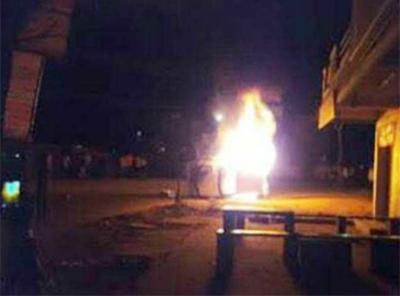Bengaluru, Feb 3: The African students in north Bengaluru closed ranks on Wednesday as details emerged of a mob of locals allegedly attacking and stripping a Tanzanian girl in the neighourhood on Sunday.
The 21-year-old girl who had been attacked met with top police officials on Wednesday to narrate what the mob had done to her. She gave her statement at the DCP's office in Peenya.
As the details spread, community leaders were constantly in touch with their fellow nationals and relayed the safer routes they should take when commuting between their homes and colleges.
"We are now scared of every Indian around us after what happened to me," the 21-year-old student of a city college told mediapersons at Sapthagiri Hospital, where she was taken for a medical test by police.
External affairs minister Sushma Swaraj took note of the incident and tweeted, "We are deeply pained over the shameful incident with a Tanzanian girl in Bengaluru."
She asked the state government to ensure the safety and security of all foreign students.
Earlier, in a note verbale, Tanzania high commission asked the external affairs ministry to take strong legal action against those who assaulted the girl.
Bengaluru police on Wednesday registered a case under 354 IPC (outraging the modesty of a woman) against unidentified persons.
Four locals were taken into custody later in the evening.
The girl's nightmare unfolded around 7.30pm on Sunday when she and her three Tanzanian friends were going in a car in Ganapathinagar, off Hesaraghatta Main Road. Almost 2km away and about 30 minutes hour earlier, a car driven by a Sudanese student had run over Shabana Taj, 35, who had been walking with her husband, electrical contractor Sanaullah.
A mob allegedly comprising locals, who were rioting following the accident, stopped the girl's car. "We got out of the car and there were many people around. There was a policeman standing nearby and I asked him what had happened. He said nothing. A friends rushed to me and asked me not to walk around. By then, the mob started hitting him," she said.
"They pushed me around and hit me. I was wearing a T-shirt. They tugged at it and tore it, leaving me literally without anything. They continued to thrash us and we ran for our lives. My friends and I hopped onto a bus. The driver didn't move and the other passengers threw us out. We were at the mob's mercy. A passerby who offered me a T-shirt was also attacked. They thrashed us again till we took shelter near some shops," she said.
The mob, meanwhile, had set ablaze the car.
As they made their way to Sapthagiri Hospital, the mob chased them. Even at the hospital, the mob allegedly threatened to storm the hospital if the Africans were not sent out.
Police sources said they took the girl's statement on Wednesday, confirming there's been a three-day delay in acting on the incident.
African student leaders condemned the killing of the woman in an accident involving a Sudanese student but said the law should take its course. However, attacking innocent people based on their ethnicity should not be tolerated, they said, adding that the matter has been taken up with their embassies too.
"A woman has died and those responsible for the accident should be brought to book. But these students had nothing to do with it," said Bosco Kweesi, legal adviser to the African students.
A leader of the Tanzanian association, said she and some of her friends rushed to the police station Sunday night, seeking help to take their injured compatriots to hospital. "They plainly refused to come to our help or accept our complaint.. Police already had one of our fellow nationals who was in no way connected to the accident in their custody. A policeman told us that 'you all look alike and your fellow national will be set free only if you bring the guilty African car driver'," she said.




Comments
She asked the state government to ensure safety and security of all FOREIGN STUDENTS. What about indian students safety? What about indian ladies safety? What about justice for raped indian girls?
Worst ruling indian government, nothing less than a british rule before independence, worried about foreigners rather than the Indians which should be the most priority.
Sushma Didi, show more and more pain as you want BJP govt. in Karnataka, there Is no such pain in your backyard for criminal acts and incidents where your party is ruling... apply Burnol deeply in to your backyard
Add new comment